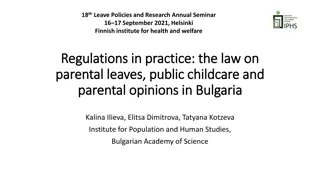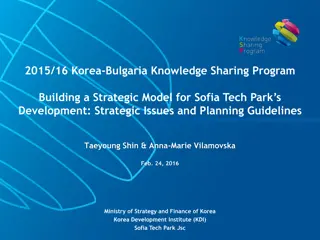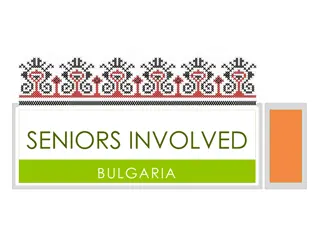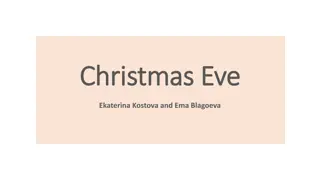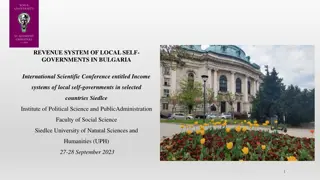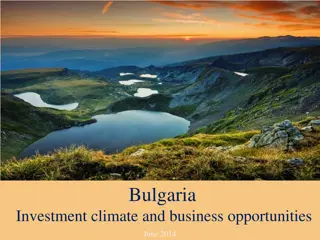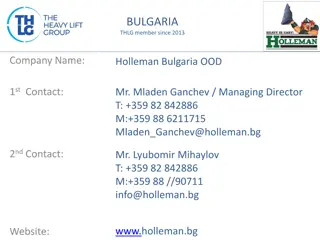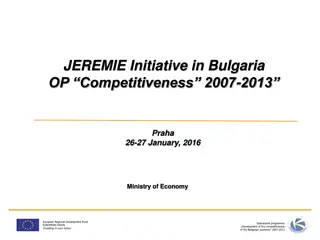
Celebrating Christmas Eve in Bulgaria: Traditions, Activities, and Preparations
Discover the unique Bulgarian traditions surrounding Christmas Eve, from the festive feast of vegetarian dishes to the special rituals like baking coins into bread. Learn about the cultural significance of this holiday celebrated with family gatherings, carol singers, and midnight Mass services. Explore the preparation of traditional Bulgarian Christmas meals and delve into the historical and cultural background of this special occasion.
Download Presentation

Please find below an Image/Link to download the presentation.
The content on the website is provided AS IS for your information and personal use only. It may not be sold, licensed, or shared on other websites without obtaining consent from the author. If you encounter any issues during the download, it is possible that the publisher has removed the file from their server.
You are allowed to download the files provided on this website for personal or commercial use, subject to the condition that they are used lawfully. All files are the property of their respective owners.
The content on the website is provided AS IS for your information and personal use only. It may not be sold, licensed, or shared on other websites without obtaining consent from the author.
E N D
Presentation Transcript
CRISTMAS EVE IN BULGARIA
ACTIVITIES Bulgarian Christmas Eve is celebrated with a feast consisting of an odd number of dishes. On this day, no meats are consumed and the meals are vegetarian. These meals include pulses, grains, vegetables, nuts, wine and an exotic array of fruit. Walnuts, in particular, are a Bulgarian Christmas must-have on the feast table. Another component of the Bulgarian meal is a loaf of bread and the 'Banitza', into which a coin is baked. Anybody who finds the coin is believed to be rewarded with good fortune. On this day, the family gathers around the table and eats their food on straw.
TRADITIONS For many Bulgarians, the preparations for Christmas start with Advent which lasts 40 days in the Orthodox Church and starts on November 15th. One legend in Bulgaria is that Mary started her labor on 'Ignazhden', December 20th and she gave birth of Christmas Eve but the birth of Jesus wasn't announced until Christmas Day. The 20th is also the traditional 'new year' in Bulgarian culture. It's traditional to eat a special ring shaped caked called 'kolaks' on this day. It's traditional that the table is left with all the food on it until the morning of Christmas Day. Following the meal some people will go to a Midnight Mass service. You might also hear Koledari (carol singers) which are normally young men who go carol singing dressed it traditional clothing. The singing can only start after midnight.
PREPARATION Christmas is the family feast of the year. On Christmas eve even our teenage brothers and sisters remain at home, celebrating with all the family. At home the whole family usually prepares all the traditional Bulgarian Christmas meals, which are the same for each family, but may differ in number. The meals should always be an odd number, and with no meat. Normally we have cooked beans, a meal from rise and spices wrapped in cabbage, or vines leaves, different kinds of salads, cheese, and most important the Christmas pita , or banitza with a coin for luck in it. We often put more luck items in the banitza, so that most of the people can get their chance. We write little notes with good wishes which, wrapped in aluminium foil we put in the pita, or banitza before baking. We have a special compote from boiled dried fruits /plumps, apples, pears and apricots with lemon and spices. And lots of nuts, pop corn and fresh fruit. Adults drink red wine. For a dessert we have fruits and a kind of pastry soaked in a very sweet syrup.
Thank you for your attention! 6thB grade 122ndPrimary school, Sofia


